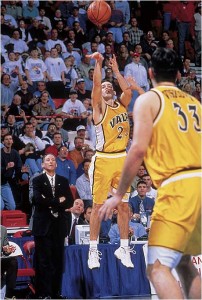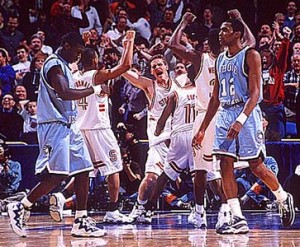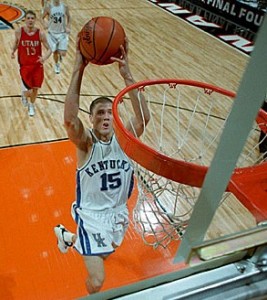Past Imperfect: The Tournament We Forgot
Posted by JWeill on March 18th, 2011Past Imperfect is a series focusing on the history of the game. Each week, RTC contributor JL Weill (@AgonicaBoss| Email) highlights some piece of historical arcana that may (or may not) be relevant to today’s college basketball landscape. This week: the lost, great 1998 NCAA tournament.
The 1998 NCAA tournament is the most exciting, bracket busting, nerve-wracking, well-played tournament in the modern era. And yet, no one seems to remember it. It’s sandwiched right there between “Simon says, ‘Championship,’” and Khalid El-Amin atop the scorer’s table. Can you see it? Look closely, it’s there. It’s the one with the two weird teams in the Final Four, the North Carolina squad coached by the old guy (no, not Dean Smith, the other old guy) and the first-year black coach at Kentucky. Oh, I know what will help…it’s the one where the coach’s kid hits that shot. Oh, now you remember.
It’s a shame, too, that no one remembers the 1998 tourney in toto. From beginning to end, the tournament was riveting, nip-and-tuck, gut-twisting basketball. And it didn’t take long at all to shake things up. On the first day, before many people were probably even aware that games were afoot, an out-of-the-way locale provided fans with some of the tournament’s most in-your-face moments, courtesy of a few names fans would become very familiar with over the next decade but who at the time were little known outside of the basketball community. But strange things can happen in Boise.
Ben Howland, then coach of the 15th-seeded Northern Arizona Lumberjacks, had his team on the cusp of history, all even at 62 apiece with Bob Huggins’ two-seed Cincinnati with just seconds remaining. Northern Arizona was the nation’s best three-point shooting team that year, so it was doubly cruel when Cincinnati’s D’Juan Baker buried an open three to win the game with just 3.6 seconds left to save the Bearcats’ skin. But Cincinnati’s flirtation with late-game disaster would come back to bite them the next round when, this time against West Virginia, Baker again hit a deep three-pointer to give his team the lead and then strutted down the court, only to watch helplessly as Mountaineers guard Jarrod West – yes, Jarrie West — threw up a prayer that was answered with eight tenths of a second left. West’s tipped three-pointer hit the backboard and went through the net, turning Baker’s sideline strut into a slumped-over disbelief. Live by the buzzer beater, die by the buzzer beater.
Meanwhile, in Sacramento, Tennessee fans got their first glimpse of a coach they’d become all too familiar with in a few years, when Kevin Stallings-coached Illinois State ruined the Volunteers’ sunny trip West on a running layup with 1.8 seconds left in overtime. While the Redbirds would get blasted in the second round, that was small consolation for Tennessee fans. Because just a season later, Stallings would take the job at intra-state rival Vanderbilt.
But the action wasn’t all left to the Left Coast. Back in D.C., President Bill Clinton wasn’t the only one issuing denials. Washington denied Xavier a spot in the second round on a Deon Luton game-winner, while three-seed South Carolina saw B.J. McKie’s last-gasp attempt fall short, keeping the Gamecocks on the outside looking in at upset king Richmond moving on. Oh, and for good measure, Indiana needed extra time to top Oklahoma as well. Had enough? Too bad. Because if Thursday seemed like enough excitement for any single round, things were just getting started.
All across the country, the tense moments and close games continued on Friday. In Lexington, a gruff Syracuse senior from Lithuania named Marius Janulis buried not one but two three-pointers to help the Orange squeak by Iona. Then Chicago turned into Boise, with Detroit Mercy upsetting St. John’s by two and Western Michigan sending Clemson packing by three. Meanwhile, in Atlanta, UCLA outlasted Miami (Fl.) on four straight free throws in the final seconds. And then, it happened.
It would be a shot for all time. It would be replayed so often it has become an indelible part of the very tournament itself. Like Christian Laettner’s turnaround jumper, like Jim Valvano running around looking for someone to hug, the miracle shot by Valparaiso guard, and son of his coach, Bryce Drew was the artistic flourish on a first round of gripping drama. Drew’s deep three, coming on a designed play whereby a half-court pass is touch passed to a streaking Drew, was the most memorable moment on a whole tournament’s worth of memorable moments.
And then came the rest of the tournament. Happenings read like a greatest hits for NCAA play: Top seed North Carolina needs overtime to top Charlotte; No. 1 seed Kansas goes down, taken out by Rhode Island; 13th-seeded Valpo plays on, beating Florida State in overtime to reach the Sweet 16; UCLA uses free throws (again) to move on, topping Michigan; 11-seed Washington makes the Sweet 16 only to see its run ended on a last-second falling-down classic of a game-winner from Connecticut’s Richard “Rip” Hamilton; 3-seed Utah hangs on to beat West Virginia, who misses a heave at the horn. All of this before the 1998 NCAA tournament has even reached the Round of Eight.
Seemingly the only constants in the field were that no one was immune to the tension and that Duke and Kentucky were on a collision course. Among the high seeds, only the Wildcats and Blue Devils were never really challenged in the first three rounds. Kentucky tore up St. Louis and UCLA, while Duke held serve in the top half of the bracket, taking down Oklahoma State and Syracuse. Kentucky fans were as eager as anyone for the matchup, wanting a bit of revenge for the dagger Laettner had delivered six years earlier. Halfway through the game, however, it looked like those wearing Duke blue would be laughing it up again.
First-year Kentucky coach Tubby Smith had inherited a talented roster from Rick Pitino, who had caught a golden parachute to save the Boston Celtics. Smith was a logical, if decidedly not flashy, choice as a replacement. Smith’s realm was on the defensive end, where his ball-line defense was designed to choke off teams with strong interior personnel. The Blue Devils, however, were finding ways over and around the Kentucky defense to the tune of 49 points and a 10-point advantage, and at halftime, a large but subdued Kentucky contingent at the Tropicana Field in St. Petersburg had to wonder whether the new coach was going to suffer the same fate as his forebear.
But Smith’s Cats would foreshadow the Final Four to come by erasing the Duke lead in the final 10 minutes of the game. With pressure defense, Kentucky began to rattle the Duke players, forcing them into turnovers or into calling timeout to escape traps. Relying on its outside shooters and on its water bug junior point guard Wayne Turner, the Wildcats scrapped, shot and shoved their way back from an 11-point deficit with 8:41 left, finally taking the lead on Scott Padgett’s three-pointer from the top of the key. When the horn sounded, Kentucky had exorcised the demons of six years prior, making its third consecutive Final Four in the process.
And that may not have even been the most shocking finish of the day. In the West Regional Final, Kansas-killer Rhode Island, with former UCLA coach Jim Harrick at the helm, was leading the Stanford Cardinal by four and within a minute of a shocking entry into the Final Four. Then it all unraveled. Rams forward Luther Clay was called for a foul on a made basket, allowing Stanford guard Arthur Lee to get the Cardinal within one. Rhode Island’s Cuttino Mobley was then stripped with 26 seconds left by Lee, and Stanford forward Mark Madsen gobbled up the loose ball and dunked it, drawing a foul to boot. Just like that, the Rams’ four-point advantage was a three-point hole. Still, the game hadn’t finished. Rhode Island’s Tyson Wheeler had one more chance after being fouled on a three-point attempt. But whether it was nerves, or something bigger and harder to grasp, Wheeler missed all three and Stanford moved on to San Antonio and the Final Four.
Had enough? Hardly.
The four teams at the Final Four in 1998 were all skilled, deep, experienced and hungry. Two were among the game’s blueblood programs. Between them, North Carolina and Kentucky owned nine NCAA titles. Stanford and Utah? Two, and none since 1944. But all four teams remaining on the final weekend had a chance to win, which helped add spice to an already interesting mixture of teams.
Utah was reaching the Final Four a season after most prognosticators thought it had lost its best chance. But point guard Andre Miller ran around and through teams all tournament long, including posting a rare NCAA triple-double in the Elite Eight against Arizona. In the national semifinals, Miller continued his tear, helping the Utes to a big lead that a stunned North Carolina couldn’t erase. With long Finnish forward Hanno Mottola causing damage inside and out, Utah moved on to the national title game.
Kentucky again found itself trailing at the half, causing Wildcats fans to fret again that Smith had reached the end of his first season. But with big man Nazr Mohammed struggling through foul trouble and an off shooting night, Kentucky once again would have to come out of the locker room and dictate a new pace. But again the Wildcats were capable. Mohammed got hot in the second half, using a series of hook shots and reverse layups to cut into Utah’s lead and then give UK a slim margin. The teams traded baskets all the way to overtime where Kentucky built and maintained a small lead, eventually outlasting Stanford 86-85.
The final would be another tight game, and another Kentucky comeback. This time, senior guard Jeff Sheppard would have the game of his Kentucky career at the best possible time. Utah pushed the pace in the first half and badly outrebounded Kentucky in the opening frame, 24-6. Utah had run the entire half, however, and committed 12 turnovers. The overall result was a 10-point Utah lead at the break, a deficit no team in NCAA final history had ever overcome in a second half to win.
But the 1998 Kentucky team had shown resiliency all season, first by breaking in a new coach and system and then by overcoming halftime holes in each of its last two contests. Utah added two points to the tally, reaching a 12-point advantage before Kentucky began to get going. With Utah’s big man Michael Doleac beginning to tire visibly, Kentucky started to find space in the paint and draw fouls. At just under 10 minutes remaining, Kentucky took its first lead of the championship game at 65-64. The Wildcats wouldn’t trail again. Withering pressure and waves of defenders sent at a shallow Utah bench eventually gave Kentucky an advantage it could keep. When the final horn sounded, Kentucky had captured its 7th national title, and its second in three years.
The Wildcats had also capped one of the more marvelous and memorable NCAA tournaments ever played with a fittingly close, seesaw win. Looking back now, it’s surprising that fewer non-Kentucky fans pay homage to the 1998 tournament, as it contained many lasting moments of last second drama and individual brilliance.
So why don’t fans refer to the ’98 edition as the gold standard? Maybe we were all a bit distracted. After all, in the background was a president’s sex scandal playing out in slow-mo. There was Iraq facing UN sanctions, Pakistan testing nukes: the usual batch of grim world news. But that sort of outside stress can always be said to be the case.
Or maybe it was simpler than that. Maybe it was Kentucky Wildcats fatigue, or the presence of two un-traditional powers in the Final Four. Whatever it was, it’s a shame that the 1998 Tournament isn’t more commonly referenced. Because for three weeks, teams from across the country gave fans a vision of what the NCAA tournament should be all about – drama built of humanity and effort, of sacrifice and shattered dreams, of will and of attitude. It was quite a ride.














































Loved this article. Thanks for linking to all the past game stories, I loved reading them. I have loved every article in this series, I hope it continues.
wow…thanks for strolling us down memory lane…I’m with JR – this series is awesome.